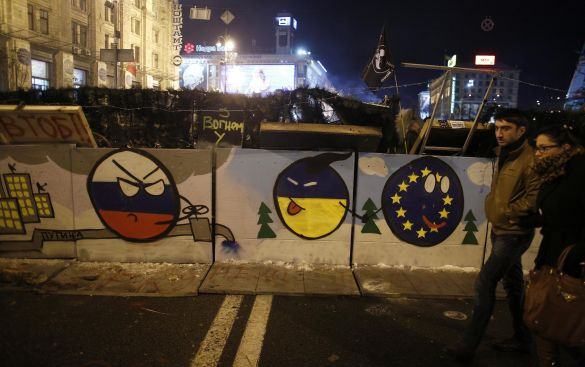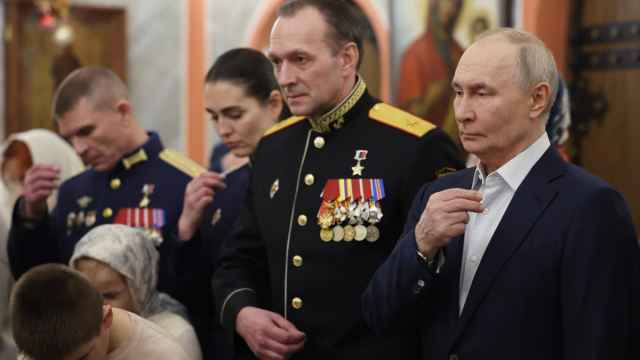Ukraine's opposition leaders urged hundreds of thousands of pro-Europe protesters at a rally on Sunday to keep up pressure on President Viktor Yanukovych to sack his government and drop plans for closer ties with Russia.
The protesters, gathered on Kiev's Independence Square, are furious with the Yanukovych government for its decision to ditch a landmark pact with the European Union in favor of a trade deal with Moscow, Ukraine's Soviet-era overlord.
On Sunday evening, protesters toppled a statue of Vladimir Lenin.
The statue has symbolic importance as it underlines Ukraine's shared history with Russia.
A Reuters reporter at the scene saw the protesters breaking up the statue with hammers after toppling it with the help of metal bars and rope.
Sunday's rally marks a further escalation in a weeks-long confrontation between authorities and protesters that has raised fears for political and economic stability in the former Soviet republic of 46 million people.
"This is a decisive moment when all Ukrainians have gathered here because they do not want to live in a country where corruption rules and where there is no justice," said world heavyweight boxing champion-turned-politician Vitali Klitschko.
The opposition accuses Yanukovych, who met President Vladimir Putin on Friday, of preparing to take Ukraine into the Moscow-led Customs Union, which they see as an attempt to recreate the Soviet Union.
"We are on a razor's edge between a final plunge into cruel dictatorship and a return home to the European community," jailed opposition leader Yulia Tymoshenko said in an emotional message to the crowd read out by her daughter Yevgenia.
"There is a significantly greater chance of ending up in a medieval dictatorship; the choice is in your hands," said Tymoshenko, Yanukovych's main rival, who is serving a seven-year jail sentence for abuse of office, in a case condemned by the West as politically motivated.
Anti-Russian Rhetoric
Tymoshenko, whose fiery rhetoric galvanised protesters in the 2004-05 Orange Revolution that denied Yanukovych the presidency then, appealed to the protesters not to give in and not to agree to negotiate with Yanukovych's "gang."
Far-right nationalist leader Oleh Tyahnybok asked the crowd "Do we want to go under the yoke of Moscow?", to which they bellowed "No!". When he asked "Do we want to return to Europe?", they yelled "Yes!".
A group of protesters later moved towards the government building, a kilometer away, and began to erect tents and barricades, apparently with the aim of stopping normal government activity next week.
Independence Square has been transformed into a makeshift village of tents, festooned with Ukrainian blue and yellow flags, EU flags and opposition banners, beneath a large television screen. People huddle around braziers for warmth.

A pair passing a barricade in Kiev’s Independence Square with cartoon depictions of Russia, Ukraine and the EU.
In a gesture sure to annoy Yanukovych, protesters hoisted a huge portrait of Tymoshenko onto a New Year tree, festooned with anti-government placards, that towers over the square.
The Moscow and Kiev governments have both denied that Putin and Yanukovych discussed the Customs Union in their talks on Friday in the Russian Black Sea resort of Sochi, but further bilateral talks are planned for Dec. 17.
Yanukovych and Putin, who regards Ukraine as strategically vital to Moscow's own interests, are widely believed to have struck a bargain whereby Ukraine obtains cheaper Russian gas and possibly credits in exchange for backing away from the EU.
Klitschko, who appears to be emerging as a possible leader-in-waiting, told protesters they would achieve their aim, though he stressed the need to stay peaceful.
Demands
Last weekend, riot police beat protesters and journalists, triggering EU condemnation and swelling the protesters' ranks.
"We do not want to be kept quiet by a policeman's truncheon," Klitschko told Sunday's crowd.
He demanded the release of political prisoners, punishment of those responsible for last weekend's police crackdown, the resignation of Prime Minister Mykola Azarov's government, and early presidential and parliamentary elections.
Those camped out on Independence Square have been swelled by huge numbers coming in from Ukrainian-speaking areas of western and central Ukraine, where opposition politicians enjoy strong support.
A Tymoshenko ally, former interior minister Yuriy Lutsenko, appealed to people in Russian-speaking areas of the east — the bedrock of Yanukovych's power — to turn out and join the protests. "We are the same people as you are, except that they stole from you earlier," he said.
Police have threatened to eject protesters occupying public buildings including Kiev City Hall, which is a stone's throw from the makeshift barricades limiting access to the hub of the protest movement on Independence Square.
But on Sunday it remained the organizational headquarters of the protests, where volunteers were signing up be on security duty or offer legal aid to demonstrators should the protests turn sour. Some demonstrators were asleep on mats on the floor of the main hall, while others were rifling through a huge pile of donated clothing.
"The current authorities have been completely discredited by their actions and the police brutality. What unites everyone here is a desire to see a change of government. We need new elections," said Svyatislav Zaporozhit, 26, who works in retail in Kiev.
"I do not want to go back to what my parents lived under the Soviet Union … When I am old, I want to live like people in Europe. I want to live in a normal country."
Ukraine's security service says it is investigating several opposition leaders suspected of attempting to seize power amid the massive anti-government protests gripping the country.
Sunday' statement by Ukraine's Security Service raised the stakes in the opposition's standoff with President Viktor Yanukovych.
The announcement came hours after hundreds of thousands of angry Ukrainians occupied the capital's main square and blockaded approaches to key government buildings during the third straight week of such protests.
The opposition responded by saying that any possible attempts to impose a state of emergency would lead to even more protests.
Sunday's protest — the biggest in Ukraine since its pro-democracy Orange Revolution in 2004 — denounced Yanukovych's recent decision to turn this ex-Soviet republic away way from Europe and closer to Moscow. (AP)
A Message from The Moscow Times:
Dear readers,
We are facing unprecedented challenges. Russia's Prosecutor General's Office has designated The Moscow Times as an "undesirable" organization, criminalizing our work and putting our staff at risk of prosecution. This follows our earlier unjust labeling as a "foreign agent."
These actions are direct attempts to silence independent journalism in Russia. The authorities claim our work "discredits the decisions of the Russian leadership." We see things differently: we strive to provide accurate, unbiased reporting on Russia.
We, the journalists of The Moscow Times, refuse to be silenced. But to continue our work, we need your help.
Your support, no matter how small, makes a world of difference. If you can, please support us monthly starting from just $2. It's quick to set up, and every contribution makes a significant impact.
By supporting The Moscow Times, you're defending open, independent journalism in the face of repression. Thank you for standing with us.
Remind me later.






